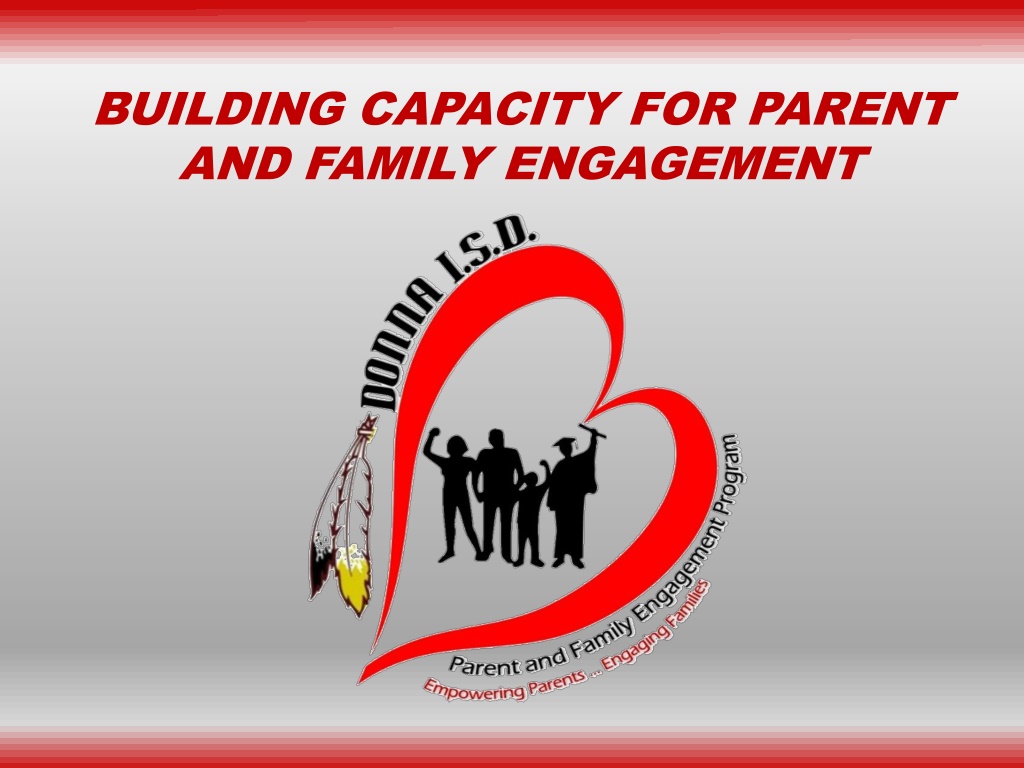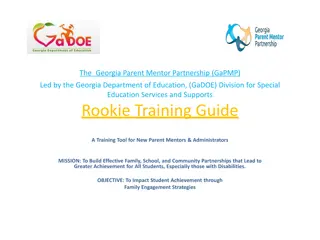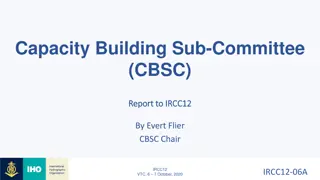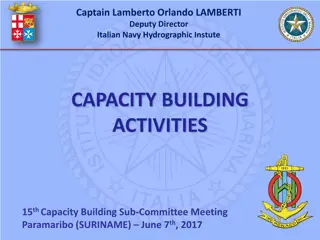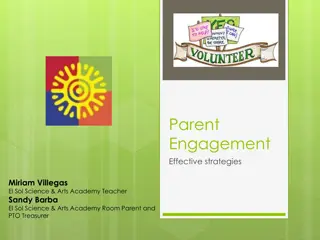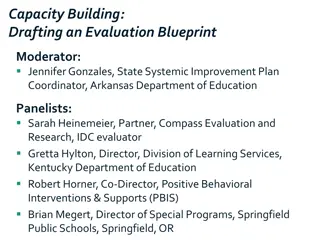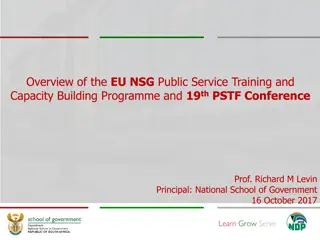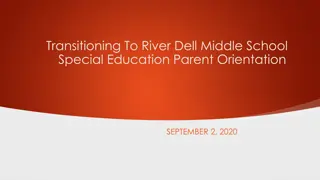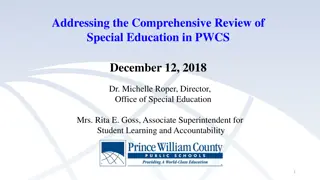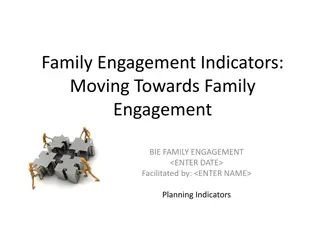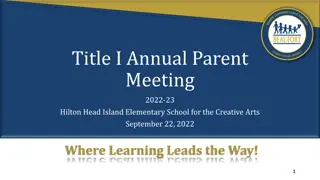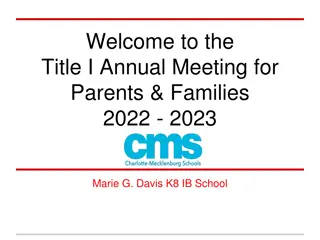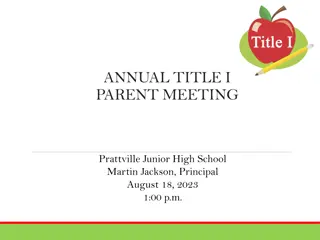Building Capacity for Parent and Family Engagement in Education
This training program focuses on enhancing parent and family engagement in education by providing comprehensive information on the Every Student Succeeds Act of 2015 (ESSA). The goal is to ensure all ESSA parent engagement requirements are met, increase engagement at the district and school level, foster collaboration between districts and schools, and empower parents with information about their rights under ESSA/Title I.
Download Presentation

Please find below an Image/Link to download the presentation.
The content on the website is provided AS IS for your information and personal use only. It may not be sold, licensed, or shared on other websites without obtaining consent from the author. Download presentation by click this link. If you encounter any issues during the download, it is possible that the publisher has removed the file from their server.
E N D
Presentation Transcript
BUILDING CAPACITY FOR PARENT AND FAMILY ENGAGEMENT
What is our Goal? What is our Goal? The bottom line is engaging parents in the learning of their children! This training will provide district and campus staff with comprehensive information about the Every Student Succeeds Act of 2015 (ESSA) and parent and family engagement to better serve the needs of students and parents.
Donna I.S.D. Objectives Donna I.S.D. Objectives To ensure all ESSA parent engagement requirements are met in Donna ISD. To increase parent and family engagement at the district and school level. To foster collaboration and communication between the district and schools in the area of parent and family engagement. To provide information about the rights of parents under ESSA/Title I.
Why should states, districts, and schools collaborate with parents? Student Achievement
State State- -District District- -School Collaboration Collaboration School Parent Engagement = Student Achievement Policy and Fiscal Resources to Encourage Parent and Family Engagement STATE DISTRICT SCHOOL Parent Engagement = Student Achievement Implementation of Parent and Family Engagement Programs & Resources Parent Engagement = Student Achievement Technical Assistance and Resources to Encourage Parent and Family Engagement
Districts and Schools Districts and Schools Are Required Required to Connect with to Connect with Parents Parents Are School Parents District
Whats the Bottom Line? What s the Bottom Line? Accountability State, District, School Collaboration States Districts Schools Student Performance ESSA HOLDS EVERYONE ACCOUNTABLE FOR STUDENT PERFORMANCE This Accountability System Supports and Encourages Parents to Be Involved!
How does ESSA define parent and family engagement? Parental engagement is defined as the participation of parents in regular, two-way, meaningful communication involving student academic learning and other school activities.
Parent Engagement Parent Engagement The Definition Ensures the Following: That parents play an integral role in their child s learning That parents are encouraged to be actively engaged in their child s education at school That parents are full partners in their child s education and are included, as appropriate, in decision-making and on advisory committees to assist in the education of their child Carrying out other activities, such as those described in Title I, Section 1116 (e.g., volunteer activities, serving on parent councils/committees)
Is there supporting research that says parent engagement really makes a difference? What Does the Research Show?
Research Shows Research Shows Parental Engagement Benefits Parents, Teachers, and Students Districts/Schools Districts/Schools Teachers Teachers Students have higher grades and test scores Improved attendance Complete homework more consistently Students have higher graduation rates and greater enrollment rates in post- secondary education Parents Parents Extensive parent engagement leads to higher student achievement Students have higher grades and test scores Students develop realistic plans for their future Student Students s Students exhibit more positive attitudes and behavior Students have higher graduation rates and greater enrollment rates in post- secondary education
Research Shows Research Shows When Parents Are Engaged! Students that are economically disadvantaged can achieve to the same high standards. Student behaviors, such as alcohol use, violence, and antisocial behavior decrease as parent involvement increases. Students achieve at all ages and grade levels. Source: ( 2002 A Wave of New Evidence, Henderson and Mapp, USDE, Condition of Education 2000, Henderson and Berla, Clark 1983; Comer 1980, 1988; Eccles, Arbreton, et al., 1993 Eccles-Parsons, Adler and Kaczala 1982; Epstein 1983, 1984; Marjoribanks 1979 as cited in Eccles and Harold 1996)
Research Shows Research Shows When Parents Are Engaged! Students have higher grades and test scores, better attendance, and complete homework more consistently. Students exhibit more positive attitudes and behavior. Different types of parent/family involvement produce different gains. Source: (2002 A Wave of New Evidence, Henderson and MappUSDE, Condition of Education 2000, Henderson and Berla, Clark 1983; Comer 1980, 1988; Eccles, Arbreton, et al., 1993 Eccles-Parsons, Adler and Kaczala 1982; Epstein 1983, 1984; Marjoribanks 1979 as cited in Eccles and Harold 1996)
Research Shows Research Shows The achievement of a student in school is not based solely on income or socioeconomic status, but the extent to which that student s family is able to do the following: Create a home environment that encourages learning Communicate high, yet reasonable, expectations for the child s achievement and future careers Become involved in their child's education at school and community Source: (2002 A Wave of New Evidence, Henderson and MappUSDE, Condition of Education 2000, Henderson and Berla, Clark 1983; Comer 1980, 1988; Eccles, Arbreton, et al., 1993 Eccles-Parsons, Adler and Kaczala 1982; Epstein 1983, 1984; Marjoribanks 1979 as cited in Eccles and Harold 1996)
What barriers must be acknowledged for districts and schools to implement effective parent engagement practices?
Barriers to Parent Engagement Barriers to Parent Engagement The barriers that limit effective parent engagement in our schools must be identified and addressed by the district and the school. These barriers are: Economic Barriers Social Barriers Educational Barriers Language Barriers Cultural Barriers
Breaking Barriers to Parent and Family Engagement In order for parent engagement programs to be effective, existing barriers should be addressed. When barriers are acknowledged, trusting home/school relationships and effective parent engagement programs can be implemented.
Barriers at a Glance Economic Barriers: We must acknowledge the economic status of residents and develop programs that meet these needs. There is a broad range of economic situations that often arise in Title I schools (i.e., unemployment, TANF, multiple day and nighttime jobs or other income sources).
Social Barriers: We must acknowledge that families may be run by single parent households. Research shows there is also an emergence of non-traditional households and families headed by the grandparent. Educational Barriers: Parents may have limited educational attainment, which may result in difficulty in assisting children in doing homework assignments (i.e., adult illiteracy).
Language Barriers: Districts and schools are required to address the needs of students that are limited English proficient. Parents may also possess the same language limitations. Strategies must be developed to inform parents of the law in diverse languages in a practical and understandable manner.
Cultural Barriers: Districts and schools must be sensitive to cultural differences among parents and students by acknowledging the wide array of cultures and religions that exist within the school community and ensuring that all cultures are represented. Sources: www.ed.gov/policy/elsec/leg/esea02/pg2.html#sec1111 The National Network of Partnership Schools: A Model for Family-School-Community Partnerships, The Harvard Family Research Project, Prepared for the DeWitt Wallace-Reader s Digest Fund
How do we build capacity for parent and Family Engagement? BUILDING CAPACITY Written Policies School-Parent Compacts 14 Activities (See Handout: Building Capacity - for Improvement ) The following 14 Parental Involvement Activities drive parent engagement programs across the country. (6 activities are required and 8 activities are optional, but recommended)
Title I, Part A Building Capacity for Parental Involvement Each LEA and School Shall Provide 1. participating Title I children in understanding such topics as the state s academic content and achievement standards, the assessments being used, the requirements of Title I, Part A, and how to monitor their children s progress and work with educators to improve their achievement. 2. Materials and Training Each LEA and school shall provide materials and training, such as literacy training and training on how to use technology, to help parents work with their children to improve achievement. 3. Educate Educators Each LEA and school shall educate teachers, pupil services personnel, principals and other staff, with the assistance of parents, in the value and utility of contributions of parents, and in how to reach out to, communicate with, and work with parents as equal partners, implement and coordinate parent programs and build ties between parents and the school. 4. Program Coordination Each LEA and school shall, to the extent feasible and appropriate, coordinate and integrate parental involvement programs with Head Start, Even Start, and other preschool programs, and conduct other activities, such as parent resource centers, that encourage and support parents in more fully participating in the education of their children. 5. Understandable Communication Each LEA and school shall ensure that information related to school and parent programs, meetings and other activities is sent to the parents of participating children in a format and, to the extent practicable, in a language the parents can understand. 6. Other Required Activities Each LEA and school shall provide such other reasonable support for parental involvement activities as parents may request. Program Information for Parents Each LEA and school shall provide assistance to parents of
Title I, Part A Building Capacity for Parental Involvement Each LEA and School May Provide 1. Input on Professional Development Each LEA and school may involve parents in the development of training for teachers, principals and other educators to improve the effectiveness of such training. 2. Literacy Training Each LEA and school may provide necessary literacy training for parents with Title I, Part A funds if the LEA has exhausted all other reasonably available sources of funding. 3. Parents Expenses Each LEA and school may pay reasonable and necessary expenses associated with parental involvement activities, including transportation and child care costs, to enable parents to participate in school-related meetings and training sessions. 4. Parents Reaching Out to Parents Each LEA and school may train parents to enhance the involvement of other parents. 5. Convenient School Meetings Each LEA and school may arrange school meetings at a variety of times, or conduct in-home conferences between parents who are unable to attend the school meetings and the teachers and other educators who work with their children. 6. Model Approaches Each LEA and school may adopt and implement model approaches to improving parental involvement. 7. Districtwide Parent Council Each LEA may establish a districtwide parent advisory council to provide advice on all matters related to parental involvement in funded programs. 8. Community Involvement Each LEA and school may develop appropriate roles for community-based organizations and businesses in parent involvement activities.
Parent Engagement Resources
On On- -line Resources line Resources The United States Department of Education Especially for Parents: www.ed.gov/parents/landing.jhtml Organizations with Expertise in Parent Engagement: http://www.americaspromise.org/organizations-expertise-parent- engagement Helping Children Succeed in School Parental Involvement in Schools: www.urbanext.illinois.edu/succeed/parental.cfm Title I Statewide School Support and Family and Community Engagement Initiative: http://www.esc16.net/page/title1swi.home
Bilingual Parent and Family Bilingual Parent and Family Literacy Resources Literacy Resources Hispanic Family Literacy Institute Family literacy offers Hispanic families access to an on-line education and learning environment that maintains strong cultural and language bonds between parents and their children. www.losninosensucasa.org The Sesame Street Beginnings: Talk, Read, Write! This program is a bilingual multimedia program to improve the four fundamental skills for literacy development ( i.e., listening, speaking, reading, and writing.) http://archive.sesameworkshop.org/talkreadwrite/ http://plazasesamo.com Colorin Colorado: A bilingual site for educators and families of English Language Learners http://www.colorincolorado.org/
Donna Independent School District Parent and Family Engagement Department Tomas Tamez, Director 904 Hester Donna, Tx. 78537 Norma L. Guevara, Secretary 904 Hester Donna, Tx. 78537 Ph: (956) 464-1600 ext. 1230 Fax: (956) 461-9006 ttamez@donnaisd.net Ph: (956) 464-1600 ext. 1230 Fax: (956) 461-9006 nlguevara@donnaisd.net
